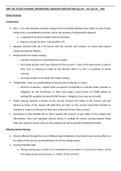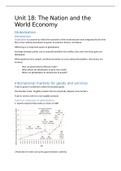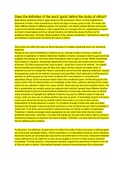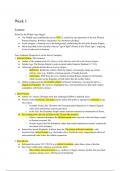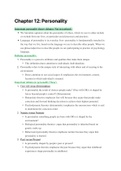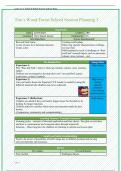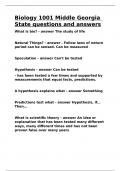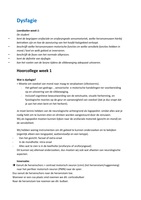UNIT SIX: ESTATE MASSING, REPUDIATION, ADIATION AND ELECTION (pg 143 – 147; pg 191 – 200)
Estate Massing
Introduction
Idea = 2 or more testators (usually 2 spouses but not limited thereto) mass whole or part of their
estates into a consolidated economic unit for the purpose of testamentary disposal
o It operates from time of death of the first testator
o Popular concept for joint / mutual wills in SA
Spouses married ICOP use it to ensure that the survivor will continue to control the massed
estates during their lifetime
Requirements for estate massing:
o Intention of parties to consolidate their estates
o First dying testator must have disposed of the survivor’s share of the joint estate as well as
their own i.e. disposal of estate by one testator ONLY in a will = no question of estate
massing
o Surviving testator must adiate the estate massing
Traditionally = seen as a manifestation of the doctrine of election or choice
o Doctrine of election = applies when acceptance of a benefit in a will also holds a burden or
obligation for the beneficiary i.e. they must make a clear choice to EITHER adiate (in
writing) OR repudiate the benefit AND burden / obligation (you may not do both)
Estate massing imposes a burden on the survivor because the estate of the survivor will also
devolve in terms of the mutual will while they are alive i.e. the survivor loses their freedom of
testation in respect of the parts of their own estate which have been massed
Acceptance of the benefits left to them requires the survivor to give effect to the mutual will;
alternatively, they may repudiate (almost always in writing) the estate massing bequest (keep
their own property and do with it as they please) and not accept ANY benefit thereunder
Effecting Estate Massing
May be effected through the use of different legal institutions, all of which have varying effects on
the rights of the survivor and beneficiaries of the first-dying testator
Usufruct (limited right)
o Massed estate goes to their son (remainderman) but there is a usufruct in favour of the
first-dying spouse (usufructuary i.e. holder of the usufruct)
, Fideicommissum (limited right)
o Massed estate will go to the surviving spouse and upon the death of the survivor, to their
children in equal shares i.e. survivor = fiduciary; children = fideicommissaries
Trust (limited right)
o Massed estate will be transferred to a trust (administered by an appointed trustee) upon
the death of the first-dying spouse
o Survivor receives a beneficiary income throughout their life and upon their death, the trust
capital (corpus) goes to their children in equal shares
Unlimited Rights (CL estate massing; NOT covered by s37 of Administration of Estates Act below)
o Family home goes to the surviving spouse (who may do with it as they please) and the rest
of the estate property goes to the children in equal shares
Consequences of Estate Massing (NB SECTION)
Consequences of Adiation
o Survivor loses the power to alter or revoke the joint / mutual will or make a will in conflict
therewith i.e. renounce the power to dispose of their consolidated assets as they wish
because by massing of the estate, they have already disposed thereof (operates
retrospectively)
Result = there is a presumption against the existence of estate massing at the CL
until the contrary is proven (e.g. just because you are married ICOP, doesn’t mean
your joint will amounts to estate massing)
Any doubt will result in an interpretation which allows the greatest possible
measure of freedom of testation in that the first-dying is deemed to have disposed
of their estate ONLY
Consequences of Repudiation
o Surviving testator may not receive any benefit from the first-dying testator – in respect of
the massed estate – under the joint / mutual will
o Surviving testator retains their own estate and may dispose of it as they wish
o The mutual will, as the will of the first-dying testator, relates to their estate ONLY, subject
to the provision that the survivor may not receive any benefit therefrom
Estate Massing
Introduction
Idea = 2 or more testators (usually 2 spouses but not limited thereto) mass whole or part of their
estates into a consolidated economic unit for the purpose of testamentary disposal
o It operates from time of death of the first testator
o Popular concept for joint / mutual wills in SA
Spouses married ICOP use it to ensure that the survivor will continue to control the massed
estates during their lifetime
Requirements for estate massing:
o Intention of parties to consolidate their estates
o First dying testator must have disposed of the survivor’s share of the joint estate as well as
their own i.e. disposal of estate by one testator ONLY in a will = no question of estate
massing
o Surviving testator must adiate the estate massing
Traditionally = seen as a manifestation of the doctrine of election or choice
o Doctrine of election = applies when acceptance of a benefit in a will also holds a burden or
obligation for the beneficiary i.e. they must make a clear choice to EITHER adiate (in
writing) OR repudiate the benefit AND burden / obligation (you may not do both)
Estate massing imposes a burden on the survivor because the estate of the survivor will also
devolve in terms of the mutual will while they are alive i.e. the survivor loses their freedom of
testation in respect of the parts of their own estate which have been massed
Acceptance of the benefits left to them requires the survivor to give effect to the mutual will;
alternatively, they may repudiate (almost always in writing) the estate massing bequest (keep
their own property and do with it as they please) and not accept ANY benefit thereunder
Effecting Estate Massing
May be effected through the use of different legal institutions, all of which have varying effects on
the rights of the survivor and beneficiaries of the first-dying testator
Usufruct (limited right)
o Massed estate goes to their son (remainderman) but there is a usufruct in favour of the
first-dying spouse (usufructuary i.e. holder of the usufruct)
, Fideicommissum (limited right)
o Massed estate will go to the surviving spouse and upon the death of the survivor, to their
children in equal shares i.e. survivor = fiduciary; children = fideicommissaries
Trust (limited right)
o Massed estate will be transferred to a trust (administered by an appointed trustee) upon
the death of the first-dying spouse
o Survivor receives a beneficiary income throughout their life and upon their death, the trust
capital (corpus) goes to their children in equal shares
Unlimited Rights (CL estate massing; NOT covered by s37 of Administration of Estates Act below)
o Family home goes to the surviving spouse (who may do with it as they please) and the rest
of the estate property goes to the children in equal shares
Consequences of Estate Massing (NB SECTION)
Consequences of Adiation
o Survivor loses the power to alter or revoke the joint / mutual will or make a will in conflict
therewith i.e. renounce the power to dispose of their consolidated assets as they wish
because by massing of the estate, they have already disposed thereof (operates
retrospectively)
Result = there is a presumption against the existence of estate massing at the CL
until the contrary is proven (e.g. just because you are married ICOP, doesn’t mean
your joint will amounts to estate massing)
Any doubt will result in an interpretation which allows the greatest possible
measure of freedom of testation in that the first-dying is deemed to have disposed
of their estate ONLY
Consequences of Repudiation
o Surviving testator may not receive any benefit from the first-dying testator – in respect of
the massed estate – under the joint / mutual will
o Surviving testator retains their own estate and may dispose of it as they wish
o The mutual will, as the will of the first-dying testator, relates to their estate ONLY, subject
to the provision that the survivor may not receive any benefit therefrom

